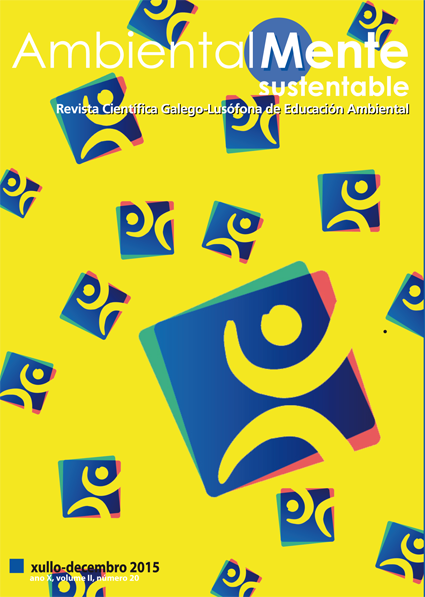Sustainability and development cooperation in textbooks from Galicia and the Dominican Republic
DOI:
https://doi.org/10.17979/ams.2015.02.020.1639Keywords:
textbooks, sustainability culture, global citizenship, cooperation and development, development educationAbstract
The purpose of this article is to present one of the study methodologies -and initial results- on which the research project “Culture of sustainability and development cooperation: reality and educational perspectives in Galicia and the Dominican Republic (PR815 A 2014-17, Call) 2014 of Subsidies in Research for the Development of the General Direction of External Relations of the Xunta de Galicia). The project aims to analyze the discourse on the culture of sustainability and development cooperation integrated in the textbooks corresponding to the baccalaureate level in Galicia, by selecting 8 textbooks, four in the field of Social Sciences and another four of Natural and Exact Sciences, in both territories. The textbook is understood as a basic tool in the orientation of teaching practice and the contents transmitted, based on the fact that all selection and approach is an ideological position in relation to the type of people we want to train and for which societies. The analysis tool is presented below and is reflected around its possibilities of application, taking as an example of study the book of Biology and Geology of 1º of Baccalaureate of Galicia and another Biology, of 3º average, of the Dominican Republic.
Downloads
References
AA.VV. (s.f.). Educación para el desarrollo y la ciudadanía global. Madrid: ONGD InteRed.
CASTRO, E.; DOMINICI, G. (2012). Biología 3. Educación Media.
CELORIO, J. (2014). Educación na e para a transición emancipadora. En Revista Galega de educación, nº 58, 16-20.
ECOLOGISTAS EN ACCIÓN (2006). El curriculum oculto antiecológico en los libros de texto. Madrid: Ecologistas en Acción.
FERRER, N.; GARCÍA VICENTE, M.; MEDINA, M. (2008). Bioloxía e Xeoloxía 1ª Bacharelato. Vigo: Edicións Xerais.
GONZÁLEZ, E. (2005). Educaçao Ambiental. Lisboa: Instituto Piaget.
GUDYNAS, E. (2002). Ecología, economía y ética del desarrollo sustentable. Buenos Aires/Montevideo: CTERA/CLAES.
GUTIÉRREZ, E. y GONZÁLEZ, É. (2010).De las teorías del desarrollo al desarrollo sostenible. México: Siglo XXI.
MARTÍNEZ BONAFÉ, J. (1992). ¿Cómo analizar los materiales?, Cuadernos de Pedagogía, 203,14-18.
NUSCHELER, F (1996). Lern und Arbeitsbuch Entwicklungspolitik. Bonn: Dietz.
PNUD (2011) Informe de desarrollo humano 2011. Sostenibilidad y equidad: Un mejor futuro para todos. México: Ediciones Mundi-Prensa. Documento electrónico, consultado el 20 de junio de 2015 en: http://hdr.undp.org/sites/default/files/hdr_2011_es_complete.pdf
Santo Domingo: Ministerio de Educación República Dominicana, Santillana.
SERRA, P. e OLIVEIRA, M. (2005), La creatividad, el pensamiento crítico y los textos de ciencias, Tarbiya: Revista de investigación e innovación educativa, 36, 59-80.
SILVA, H. da. e BOVELONI, D. (2009), Los temas “Cambios climáticos” y “calentamiento global” en los libros de texto. La falta de la mirada geológica, Enseñanza de las ciencias de la tierra: Revista de la Asociación Española para la Enseñanza de las Ciencias de la Tierra, vol. 17, 2, 190-195.
VARGAS, G. (2002). Prácticas educativas y procesos de desarrollo en los Andes. Estudio etnográfico de la comunidad Quechua de Aramasí-Provincia Tapacarí Bolivia. Universidad de Santiago de Compostela: Tesis Doctoral.
Downloads
Published
Issue
Section
License
The papers published in this journal are licensed under a Creative Commons Attribution-ShareAlike 4.0 International License.
Authors grant the right of first publication to the ambientalMENTEsustentable, which may publish in any language and format as well as publish and distribute their whole or partial content by any technologically available means and via data base.
Authors are allowed and encouraged to disseminate the articles accepted for publication on personal or institutional websites, before and after their publication, provided it is clearly stated that the work belongs to this journal and all bibliographic data are provided along with access to the document.



